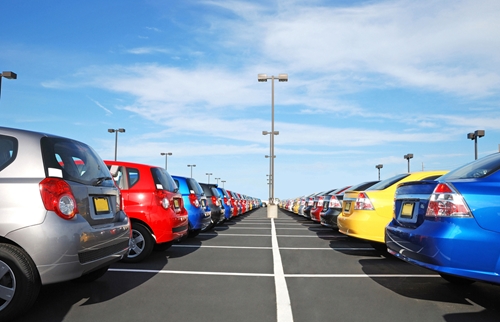Advantages of Automotive Protective Tape Over Car Bags

Recently, we’ve noticed a trend in automotive manufacturing and logistics we don’t quite understand – automakers have begun stuffing their new vehicles into heavy duty full-length protective bags before transporting them to dealerships.
While these car bags could be helpful in certain situations, protective tapes like AutoWrap not only preserve vehicles better throughout the entire transportation process, but offer automakers substantial value in other areas as well:
1. Lower per-unit cost
Let’s start with the price tag – material costs for protective tapes cost less than bags. From a budgetary standpoint, manufacturers relying on bags and looking to reduce their operating expenditures ought to compare price points against protective tapes. They may find a savings worthy enough for an immediate switch.
2. Strategic application
The materials ratio for car bagging is 1:1. One bag. One car. But with protective tapes, carmakers can strategically seal off parts of their cars under warranty instead of the whole vehicle. In the end, this cuts down on waste.
3. Quick application means lower labor cost
Don’t let the simplicity of car bagging fool you. Comparatively, protective tape applications take less time to complete.
“Wind-whipped car bags could distract drivers or block sight lines.”
4. Safer for drivers
Truckers know their stuff. Why else would manufacturers trust them to transport their goods to dealerships all over the country? But it doesn’t take a CDL-licensed driver to understand the risk posed by wind-whipped car bags. As these bags shift during transportation, they could distract drivers or even block sight lines. Alternately, protective tapes cling tightly to vehicle components with powerful adhesives capable of withstanding the rigors of the road.
5. Won’t cause abrasions
Depending on the material a particular car bag is made from, it could compromise the surface of the car it’s supposed to protect. Fasteners or zipper teeth moving back and forth across the vehicle during transportation could easily scratch or chip surfaces. On the other hand, adhesion from protective tapes won’t even leave gunk marks after removal – just a shiny, retail-ready vehicle.
6. Retains fuel economy
Simply put, aerodynamic drag hurts fuel economy. Not only has the U.S. Department of Energy said so, but automakers themselves already know this to be true. After all, they design all their vehicles with wind resistance – or the lack thereof – in mind to keep drivers safer on the road and thriftier at the gas pump. While carrier trucks hauling fleets of vehicles may not themselves be the most aerodynamic or fuel-efficient transportation around, car bags only stand to further reduce their fuel economy because of the air resistance they create.
Admittedly, just how much car bags cost in fuel is hard to say. However, consider a recent study from the Lawrence Berkeley National Laboratory that found rooftop car racks were responsible for adding 100 million gallons of gasoline to our nation’s residential fuel consumption. In theory, car bags could have a similar effect in the industrial sector. Because protective tapes stick to car surfaces, they do not produce additional drag and maximize fuel allowances for manufacturers.
7. Protection during presale
Once bagged cars arrive at their respective dealerships, sales managers must choose between two problematic options: They either remove the bag and risk damage during presale, or leave the bag on and try to sell a vehicle customers cannot see or sit in. Protective tapes were engineered with presale preservation in mind – prospective buyers can fully experience their top contenders and dealers can continue to care for exteriors and interiors.
“Car bags do nothing to protect interiors.”
Speaking of which, car bags do nothing to protect car interiors. Protective tape products like ProtectRite and low-tack carpet masking keep the insides of cars clean and flawless, even with interested customers popping in and out of the driver’s seat.
8. Smaller disposal footprint for dealerships
At the end of the day, protective materials – bags or tape – wind up in the trash. It’s a necessary evil. So, for businesses with both environmental and spatial concerns regarding waste, they seek to select protection that minimizes the disposal footprint. Because protective tapes create less waste than car bags, dealerships don’t have to spend as much on waste management resources like large trash receptacles or frequent collection.
Thinking about adding a protective element to your automotive assembly process? Trust that instinct, but remember to choose the right materials for the job.


